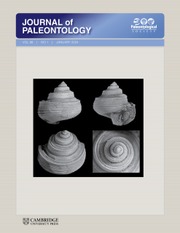Article contents
An Ordovician nectocaridid hints at an endocochleate origin of Cephalopoda
Published online by Cambridge University Press: 15 August 2019
Abstract
Nectocaridids are soft-bodied Cambrian organisms that have been controversially interpreted as primitive cephalopods, at odds with the long-held belief that these mollusks evolved from a shell-bearing ancestor. Here, I document a new nectocaridid from the Whetstone Gulf Formation, extending the group's range into the Late Ordovician. Nectocotis rusmithi n. gen. n. sp. possesses a robust internal element that resembles a non-mineralized phragmocone or gladius. Nectocaridids can be accommodated in the cephalopod total group if the earliest cephalopods (1) inherited a non-mineralized shell field from the ancestral mollusk; and (2) internalized this shell field. This evolutionary scenario would overturn the traditional ectocochleate, Nautilus-like reconstruction of the ancestral cephalopod, and indicate a trend towards increased metabolic efficiency through the course of Cambrian–Ordovician evolution.
UUID: http://zoobank.org/ed594200-37b9-4642-bd8f-4fb72dc544eb
- Type
- Articles
- Information
- Copyright
- Copyright © 2019, The Paleontological Society
References
- 3
- Cited by


